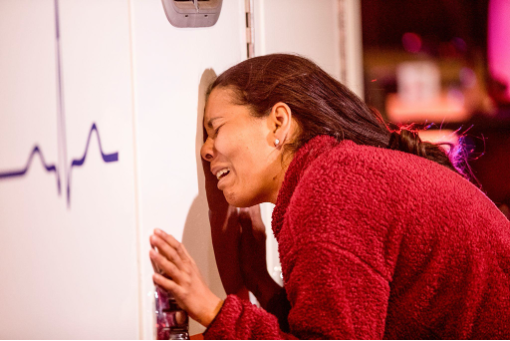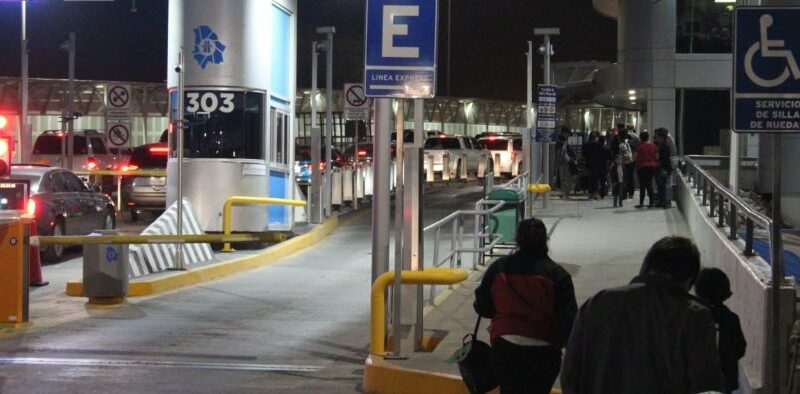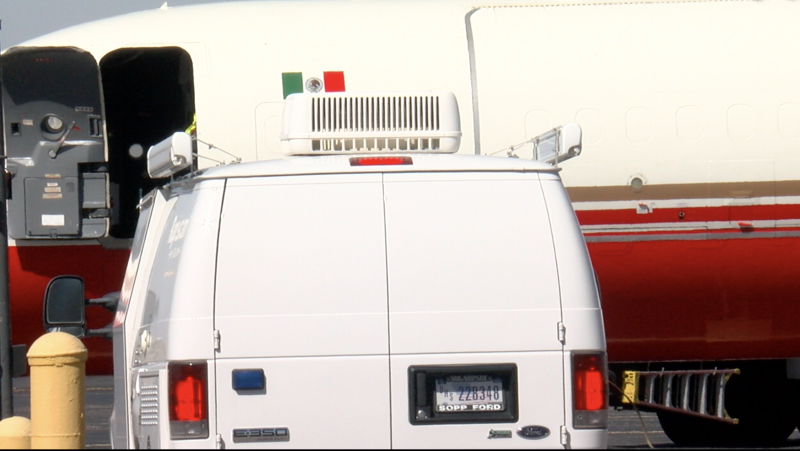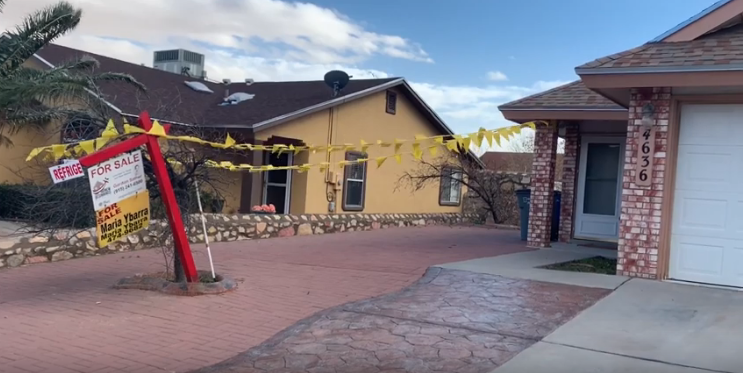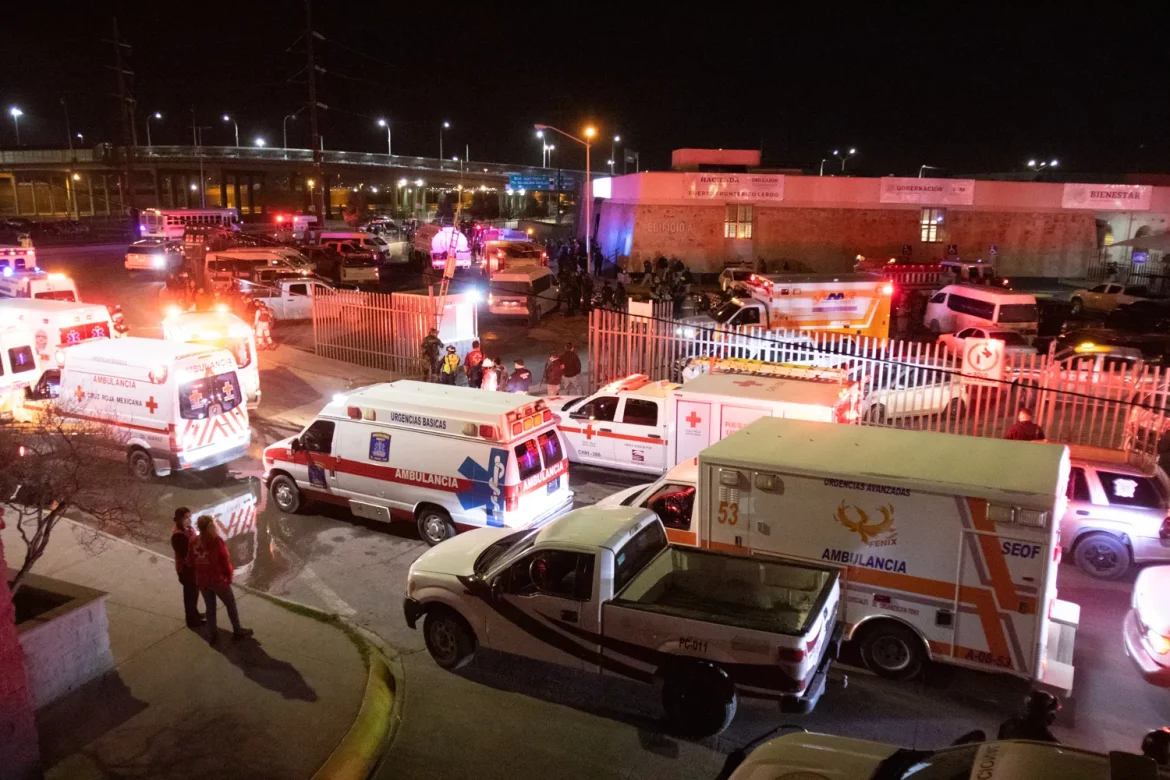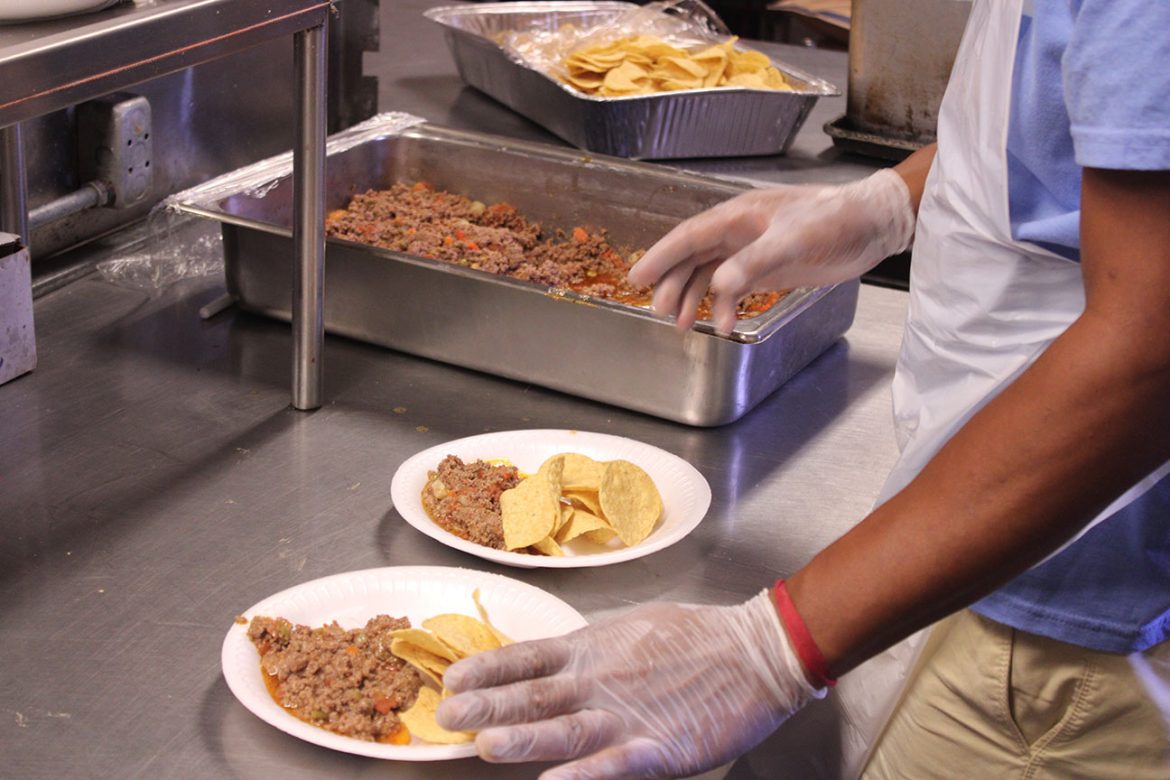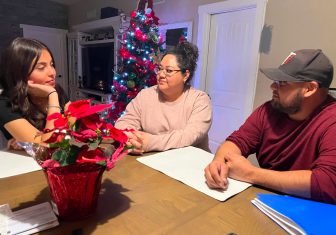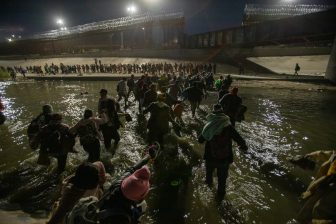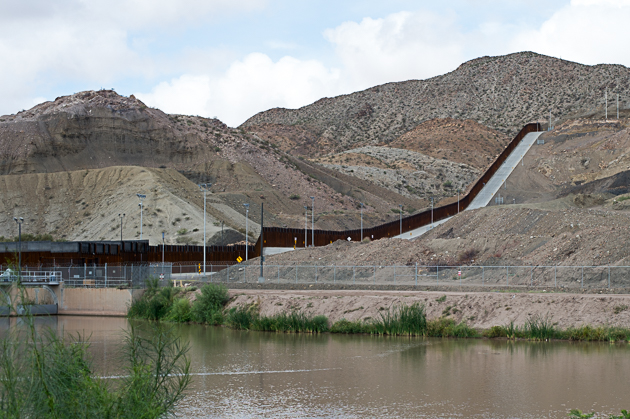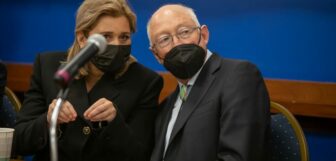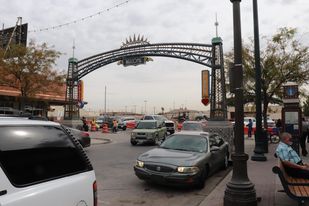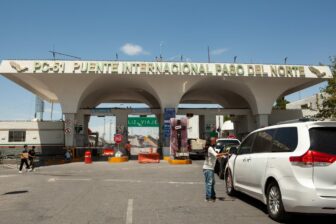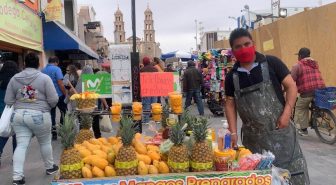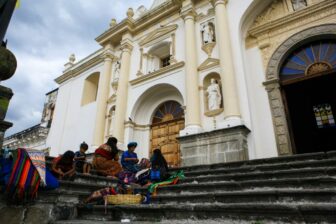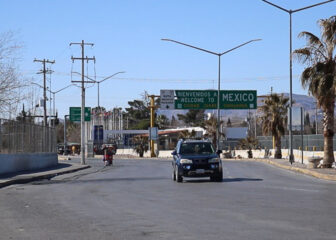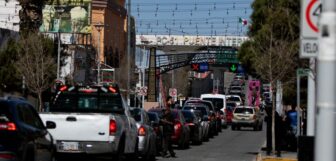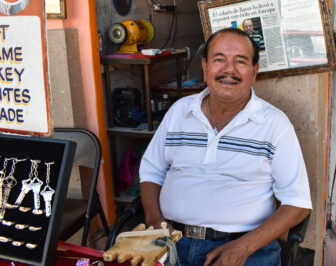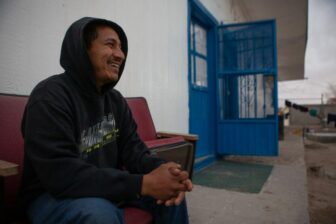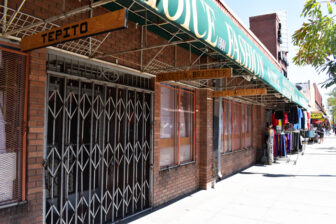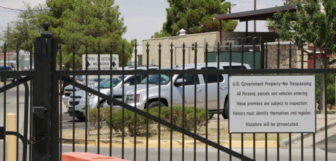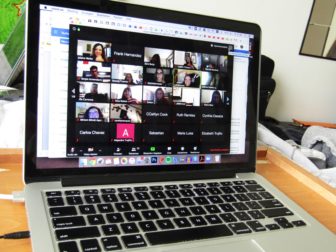An El Paso Times investigation found a region shocked by record migrant deaths in 2023 and ill-equipped to track and respond to the tragedy.
Mexican immigration agent charged in Juárez migrant center fire free on bail
|
One year after his arrest, a National Migration Institute agent identified as Eduardo A.M., who is charged in the death of 40 migrants in the March 2023 fire in Juárez, has been released from prison and placed on parole while he awaits trial.
Photo Essay: Inmigrantes de la Iglesia del Sagrado Corazón alimentan a sus propios paisanos dentro de refugio
|
EL PASO, Texas – En el corazón del centro de la ciudad se encuentra localizado el Segundo Barrio cual históricamente ha sido un lugar donde los migrantes llegan. La La iglesia del Sagrado Corazón se ha convertido en un santuario para aquellos que cruzan la frontera desde Ciudad Juárez, Mexico.Alberga temporalmente a aquellos que buscan comida, refugio y un techo para dormir. La mayoría de los migrantes provienen de Venezuela y han creado comunidad en un nuevo país. Muchos refieren ayudar en lo posible a sus compatriotas en las labores del albergue. La cocina del albergue funciona por tres turnos uno matutino, vespertino y nocturno.
DPS rammed family vehicle, pointed guns in mistaken Operation Lone Star stop, El Pasoans say
|
An El Paso family returning from a visit to Ciudad Juárez says they were forced off the road by Texas state agents who then rushed out of their unmarked vehicles and pointed semiautomatic rifles at them.
“This was excessive, way too much force. It would have been just as easy to turn on your lights, pull us over and do an investigation” said Gerardo Ayala, 37, who was in his Chevy Cruze on Oct. 12 with his wife, 13-year-old daughter and mother-in-law.
Homeland security secretary talks end of Title 42 in El Paso with migrant advocacy group
|
Local officials and nonprofits expect border crossings to increase as the end of Title 42 nears. The emergency health order allowed the U.S. to immediately expel migrants, blocking them from their legal right to seek asylum. Title 42 is set to phase out by Dec. 21.
Wong Kim Ark won landmark birthright citizenship case at the US Supreme Court. El Paso tried to deport him anyway
|
In 1901, a cook named Wong Kim Ark crossed from Juárez to El Paso with a unique distinction. He was perhaps the only person in the world who had a U.S. Supreme Court ruling declaring him by name to be a citizen of the United States.
That didn’t prevent an El Paso immigration official from arresting him and beginning deportation proceedings.
Problems remain for private border wall builders after founder’s guilty plea in fraud
|
by Jeremy Schwartz and Perla Trevizo, ProPublica
Brian Kolfage arrived in Texas three years ago pledging to help fulfill President Donald Trump’s promise of a “big, beautiful” wall along the U.S.-Mexico border. After pleading guilty to federal fraud charges last month, Kolfage leaves behind two small stretches of fencing that are mired in legal, environmental and permitting fights.
How I became a bridge for my international family during the pandemic border shutdown
|
Four years ago my family in Mexico supported my dream to come to El Paso for my college education in the United States. Little did we know that we would struggle with the burden of being separated by the pandemic when the U.S. and Mexico restricted travel across land border crossings to essential reasons. Visiting family was not among the essential reasons for crossing back and forth. Both my mom, Patricia, and my brother Christian are Mexican citizens. We were all born in México.
US ambassador, Chihuahua mayors agree to unite against violence in northern Mexico
|
CIUDAD JUÁREZ — U.S. Ambassador to Mexico Ken Salazar signed an agreement with mayors of six cities in Chihuahua, with the goal of preventing violent crime, building citizen trust in Mexican police forces and reducing corruption. “This can be a historic moment because it can mark a new start in ensuring our people can live without fear,” Salazar said. The U.S. Agency for International Development will fund the initiative as part of a four-year, $19.4 million Violence Prevention and Reduction Activity program across 32 cities in 10 states in Mexico. Details about how the funding will be used to help reduce violent crime were not discussed and Salazar did not hold a scheduled press conference because he had to catch a flight to Tijuana right after the signing ceremony. Salazar and Chihuahua Gov. Maria Eugenia Campos Galvan led the signing ceremony Friday night at the U.S. Consulate in Ciudad Juárez.
Reapertura de la frontera de El Paso, Texas y Ciudad Juarez
|
Fue en marzo del 2020, que Estados Unidos decidió cerrar sus puertas de la frontera debido a la pandemia del COVID-19. Desde ese entonces, comerciantes como en la zona centro de la ciudad de El Paso, no pudieron continuar y se ve reflejado en los letreros y en los locales abandonados, pero algunos otros, si decidieron continuar, aun sin los clientes de México. Socorro Pinales, empleada de “Contigo”, un negocio ubicado al cruzar el puente internacional Santa Fe, trabajo durante todo el tiempo que permaneció cerrado y cuenta como pasaron estos casi dos años en términos de ventas y que es lo que esperan para las próximas fechas festivas como el dia de accion de gracias y navidad ahora que la frontera ha sido abierta. “Pues las ventas antes si eran muy bajas, muy muy muy bajas, hubo días que en esta tienda no se vendió ni $100 dólares, no sacamos ni lo que era lo de la empleada y literalmente era yo solita aquí, porque no, no había ventas”, Pinales dijo. https://youtu.be/9oDHEeDYCuM
Pero hoy con la reapertura de la frontera, los negocios esperan que las ventas incrementen o que al menos, sea mejor de cuando se mantuvo cerrado, así lo cuenta Pinales.
What you need to know about the U.S. border reopening to ‘non-essential’ traffic on Nov. 8
|
By Lauren Villagran / El Paso Times
At midnight on Monday, Nov. 8, the U.S. Department of Homeland Security lifts the restrictions to “non-essential” traffic at the U.S.-Mexico border. That means that Mexican nationals with a valid border crossing card will able to return to El Paso and other U.S. border communities to shop and visit friends and family for the first time in 20 months. Here’s what you need to know. Does the change affect U.S. citizens or lawful residents?
Juarez street vendors adapt to survive business downturn in the pandemic
|
A large community of mobile vendors depend on street sales to feed their families in Ciudad Juárez. The covid-19 pandemic disrupted the Mexican economy and threatened disaster for many who don’t hold traditional jobs along the border with Texas. Here is a look at what they were going through in 2021. “Elotes! Mangos!
UTEP helped parents from Mexico attend our graduation, but pandemic border-crossing rules remain unfair
|
For the first time in more than a year my Mexican parents will able to cross the border from Ciudad Juárez using a special waiver to attend my commencement ceremony at University of Texas at El Paso. Since March 2020, crossing the border has been restricted to essential travel including crossing for work, medical or academic reasons in an attempt to stop the spread of Covid-19. Because of that, when UTEP graduating seniors got the news that in-person commencement was happening, I thought I would be alone at the ceremony, walking the stage at the Sun Bowl Stadium while my parents watched a live stream from their home in Juárez. I wrote a letter to University of Texas at El Paso President Heather Wilson in what I described as “a hopeful attempt to make my graduation a memorable one.”
In the emailed letter, I explained that my parents are both Mexican citizens living in Juárez, and because the border remains closed except for essential travel during the pandemic, they would not be able to attend my commencement ceremony. I understood, I told her, that she could not open the border to my parents, but that she did hold a position of authority and power that is unique when it comes to being the voice of UTEP students and amplifying their concerns.
Indigenous diaspora: The arduous journey from Guatemala through Mexico
|
By René Kladzyk and Maria Ramos Pacheco/El Paso Matters and Veronica Martinez/La Verdad
First of a three-part series
Running children and crying babies create a cacophony at El Buen Samaritano shelter, but in a far corner, Carmela holds her 2-year-old in silence. She can’t communicate with anyone — she doesn’t know Spanish, and no one at the facility can understand the Indigenous language she speaks. Indigenous migrants like Carmela encounter extra hurdles in attempting to reach the United States: communication difficulties, cultural barriers and anti-Indigenous discrimination. In this three-part series, we’ll trace the path of a migration journey from Guatemala, investigating the challenges that Indigenous migrants face at every stage. Part one looks at migration drivers and the arduous journey across Mexico; part two discusses added barriers at the U.S. border as Indigenous migrants interact with immigration officials; and part three centers on the struggles Indigenous migrants face in shelters in Juárez and how they’re rendered invisible in U.S. immigration courts.
Cross-border romance disrupted, but not defeated by pandemic restrictions on travel
|
The cities of El Paso, Texas, and Juarez Mexico are side by side, but to some Borderland couples it seems like they are worlds apart since the pandemic closed the border to all but essential travel. The U.S. imposed limits on border travel in March 2020 in response to the rising COVID-19 crisis. Only U.S. citizens, permanent residents and those designated as essential travelers can cross. That means no crossing for recreation and tourism to go shopping or visit family and friends. Love is not considered essential under the travel ban, which makes it hard for cross-border couples like Briana Martinez and her boyfriend, Oswaldo Cuevas, who once freely traveled between cities to stay connected.
Familias fronterizas continúan lidiando con la ansiedad de que surja una emergencia cuando los cruces siguen limitados
|
CIUDAD JUAREZ — Desde el 21 de Marzo, 2020, los cruces en la frontera de Estados Unidos y México han sido limitados para viajes esenciales por la pandemia. Esto ha prevenido que la gente que solía cruzar en algunos casos diariamente visite a su familia, creando preocupaciones cuando surgen emergencias. Mario Eduardo Morales, 44, se encontró en un predicamento cuando los doctores encontraron un brote en el párpado de su hijo de un año y le informaron que tendrían que operarlo. “Fue la razón por la que yo intente solicitar el pase de humanidad, para ir a estar con él,” dijo Morales. El único problema es que su esposa vive en El Paso y el en Ciudad Juárez, ya que cada uno trabaja en su respectiva ciudad.
‘Pasadores’ serve as personal shoppers for border dwellers who can’t cross amid pandemic
|
CIUDAD JUAREZ — Before border pandemic travel restrictions, shoppers from Mexico crossed daily. But during the pandemic more been forced to turn to others to get the products they want or need from the U.S. side of the border. For more than a year, the border between the U.S. and Mexico has been closed to all non-essential travel in an attempt to stop the spread of Covid-19. Some U.S. citizens and legal residents are still going back and forth because the authorities can’t keep them from returning home from Mexico. Mexican citizens with border crossing cards or visas though are only allowed to visit the U.S. for reasons that are essential including work, school or medical appointments.
Border travel restrictions in Detroit and El Paso show the uneven impacts of COVID-19
|
Nathaly Gonzalez crosses from El Paso to Ciudad Juárez a couple times a week. She brings groceries to her grandparents — they prefer the bulk foods sold on the U.S. side. She visits her brother and takes her dog to the vet.
Gonzalez and her mother are dual U.S.-Mexican citizens and live in El Paso; her brother and grandparents are Mexican citizens and live in Ciudad Juárez.
Things have changed significantly for Gonzalez and her family since the COVID-19 travel restrictions went into effect on March 21, 2020, but she still crosses with ease, regardless of whether her reasons for crossing could be defined as “essential.”
Vulnerable transgender asylum seekers create shelter together in Juárez
|
On a warm February afternoon, Susana Coreas stands outside the door of Casa de Colores in Ciudad Juárez holding a phone in one hand and a 50 peso bill in the other.
As she hands the money to two women leaving the building, Coreas pauses her phone call and greets the visitor at her door.
“Adelante, esta es su casa,” she says. Go ahead, this is your home.
Artesano batalla durante cierre de la frontera por pandemia
|
Ciudad Juárez — En esta región fronteriza, COVID-19 ha causado un gran impacto económico en centros comerciales, y negocios pequeños. Los gobiernos de México y Estados Unidos cerraron puentes internacionales en Marzo durante la pandemia. Solo está permitido cruzar por razones esenciales e ir de compras no es una de las razones. Muchos negocios ubicados en la Avenida Juárez tuvieron que cerrar temporalmente a causa de la pandemia y siguen afectados por restricciones en los puentes internacionales Estos negocios dependen del turismo y clientes que cruzan el Puente Internacional Paso del Norte. “Afecta mucho a los países de los dos lados pero aquí nos afecta más porque estamos esperanzados en el turismo,” comento Antonio Hernández Camacho, joyero en Avenida Juárez.
Border pandemic travel restrictions create obstacles for patients who get dental care in Mexico
|
CIUDAD JUAREZ — El Pasoans and other U.S. citizens who rely on dentists in Mexico for lower cost dental care face obstacles as COVID-19 travel restrictions remain in place nearly a year later.
The U.S. and Mexican governments in March 2020 limited cross border travel at land ports of entry to “essential reasons” including work, school or medical care. Though dental care is allowed, patients say they face long lines at the border when returning to the U.S. side.
“Before the restrictions that we’re facing now, I used to go like once a month, and they were pretty simple. I would go in come back in an hour, actually,” said Norma Perez, an El Paso patient who crosses into Ciudad Juarez.
How I learned to cope when my family was separated by border pandemic restrictions
|
Ciudad Juarez — Since March, the international border has been closed, only allowing essential travel for work, school and medical reasons during the pandemic. The virtual border shutdown has been extended by both the U.S. and Mexican governments each month through February according to the Department of Homeland Security.
The border closure meant my mother, who works in El Paso, had to move to the U.S. side of the border since she didn’t want to have to deal with long lines at the international bridge and the possibility of being turned back even though she was crossing for her job. My mother is in El Paso with my 11-year-old brother while I and my 19-year-old brother live in Juárez.
Biden ends ‘Remain in Mexico,’ allowing thousands of migrants to stay in U.S. for asylum cases
|
Migrants trapped in Mexico for more than a year by one of former President Trump’s most controversial policies rejoiced to the news Friday that the Biden administration was ending the so-called Migrant Protection Protocols and allowing people in that program to gradually come to the United States to pursue asylum claims.
Local business in Juarez adapts to border shutdown
|
CIUDAD JUAREZ — Months after the U.S.-Mexico border was closed to all but essential travel as a COVID-19 precaution, small businesses have been forced to find ways to new ways to cope.
“Many of our clients are from El Paso, so at first, they didn’t come as often because the situation was difficult,” said Natalia Briceño, 23, creative director for the nail salon Durazno Claro.
Our traditional cross-border Christmas celebration will be missed this year
|
“¡Ya llegué!” I wake up to the sound of Mamy’s voice early in the morning, it’s Christmas Day. I open my eyes groggily, still sleepy from Christmas Eve celebrations, I put on my holiday robe that I love and make my way to the kitchen. There are loud clanking noises and shuffling sounds coming from the kitchen, and I can already smell the deliciousness that my mom is stirring in a huge olla. I walk into the kitchen and I see my grandma who just crossed the border from Ciudad Juárez, Mexico, to my house in El Paso, Texas. We meet halfway and she gives me a tight hug.
Pandemic measures change college life for international students
|
The “college experience,” usually depicted as an exciting time of meeting new people and exploring new opportunities, has changed dramatically due the COVID-19 pandemic. From classes switching to online teaching, technology issues and economic hardships, the pandemic has proven to be challenging for many students. But some Mexican international students in El Paso faced even more challenges after some government offices closed and new restrictions were placed on travel across the U.S.-Mexico border. Irving Avalos Guzman, 19, a first-year international student from Ciudad Juarez, Mexico, was unable to get his student visa processed on time for him to attend any classes at the University of Texas at El Paso in person. “I would like to cross the border, go to the classes, hang out in UTEP, meet new people,” Avalos Guzman said.
La nueva convivencia de ‘gamers’ a través de las redes sociales durante la pandemia
|
CIUDAD JUAREZ — Las redes sociales se han vuelto más transitadas tanto para buscar información como para convivir debido a la cuarentena puesta por la pandemia del COVID-19, donde se recomienda distanciamiento social.
Como medio de información, las redes sociales han servido para mantener a gente de diferentes partes del país al tanto de la situación de cuarentena de los demás y además han ayudado muchos convivir y encontrar diversión mientras se encuentran aislados.
South El Paso merchants struggle to hold on after sales plummet amid border travel restrictions
|
Downtown El Paso stores that have long relied on shoppers from neighboring Mexico for a majority of their sales have taken a big hit from cross-border travel restrictions during the COVID-19 pandemic.
Soccer team with players on both sides of the border rebuilds in response to pandemic limitations
|
As COVID-19 arrived at the borderland, many of those who frequently cross from Ciudad Juárez to El Paso, but are not U.S. citizens or U.S residents, had to stay back in Mexico. For the Dynamo Futbol Club, a local amateur soccer team based in El Paso, that meant some of the players on the team that are from Ciudad Juárez were unable to finish the season. Dynamo encountered many challenges as the pandemic of COVID-19 began in the spring of 2020. Eight players who lived in Juarez were not able to cross to El Paso, after the U.S. limited entry to U.S. residents and essential travelers, such as students. Players on the team range in age from 20 to 35 years old.
El Paso ICE facility guards accused of sexual assault, harassment
|
Three detainees at ICE’s El Paso Processing Center say they were sexually assaulted or harassed by guards, and their attorney is calling for an investigation. “The terrors of detention at our local El Paso ICE facility have morphed into a new horror. Over the last several weeks, I’ve recorded deeply disturbing and troubling accounts by women and men who have become victims of sexual assault and sexual harassment by guards at the detention center,” said Linda Corchado, an attorney with Las Americas Immigrant Advocacy Center in El Paso. Attorney Linda Corchado discusses accusations of sexual assault and harassment involving guards at ICE’s El Paso Processing Center. Immigration and Customs Enforcement spokeswoman Leticia Zamarripa said the agency “has zero tolerance for any form of sexual abuse or assault against individuals in the agency’s custody and takes very seriously all allegations of employee misconduct.
Frank Hernandez – A short story of the COVID-19 pandemic in my life
|
As the COVID-19 pandemic was declared by the World Health Organization on March 11, I knew my life would dramatically change. I just didn’t know how much.Some professors were already talking about transitioning to online learning, some of my plans were starting to fall apart, and I found myself washing my hands at every chance I had.At first, things were not that bad – Spring Break had been extended for a week and my university decided to transition to online learning for the rest of the semester. As I live on the Mexican side and study and work in the U.S., this meant that I didn’t have to cross the border every day for the next two months a half – quite a relief.For the next weeks, my life was fairly tranquil. I had the time to read more than I normally do – something I was overly happy about.I was able to cook more often than I normally do, and generally had to improvise because going to the supermarket every time something was missing wasn’t really an option.I even started planting my own chiles.Though I knew things were not alright and people all around the world were suffering the devastating effects of this pandemic, I still found some comfort in cooking with my family on a Friday morning.It was until mid-April that the pandemic started affecting me negatively – or my plans to be precise. I had submitted a paper to a conference in Oneonta, New York, which was cancelled due to the outbreak in the state.
